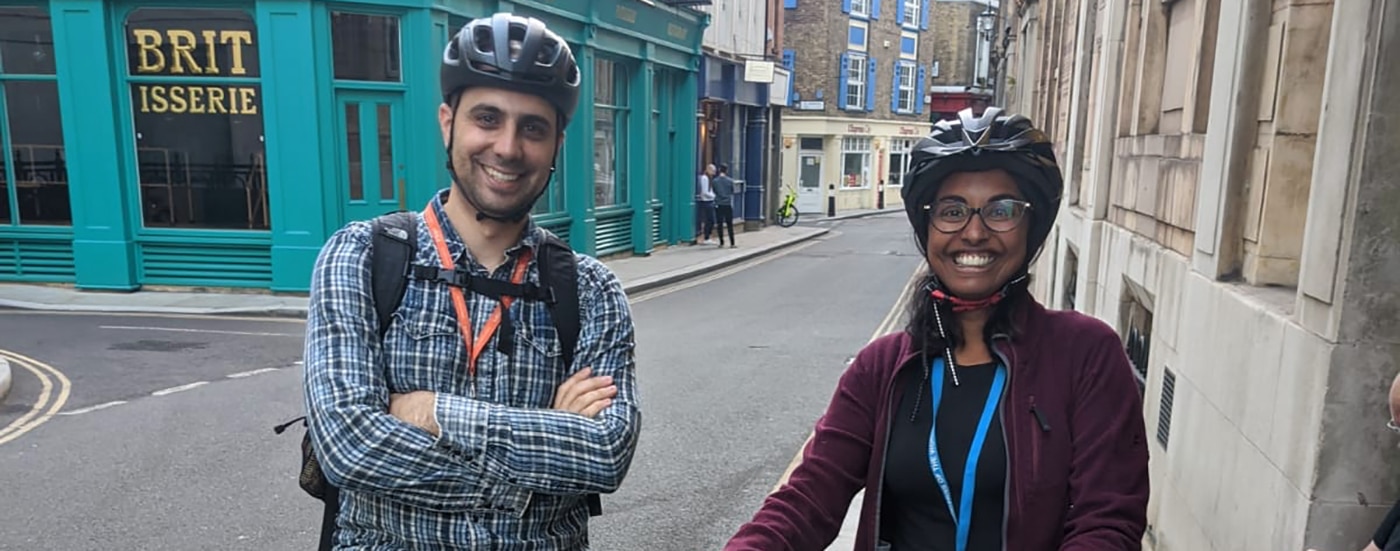Part 2: How I’m helping rough sleepers in London access healthcare
Published 14th August 2020
Continued from Part 1.
We come across one rough sleeper we know from our previous outreach work – a gentleman, who we think is somewhere in his 60s. He’s been in the City of London for years and he’s been a rough sleeper, all around London, for decades.
He is somebody who doesn’t engage with homeless support services. Often, if anybody approaches him, he starts to walk away straight away, or he’ll start shouting at you asking you to leave. If you do manage to ask him a few questions, he’ll give you a few answers, and then he’ll quickly get very angry and ask you to leave.
This gentleman, unfortunately, had to be hospitalised last year for a severe infection in his legs. He had refused medical treatment for weeks and weeks and weeks, and it got to the point where he was so frail and unwell, we had to use the Mental Capacity Act to admit him to hospital.
He has very swollen legs and struggles to walk. He also seems to have some sort of problem with his spine which means he’s very hunched over as well and at times he looks uncomfortable with neck and shoulder pain. But when you ask him about these things, he says it’s just about getting old. He accepts it and thinks there’s nothing that can be done for it.
This gentleman disappeared for a bit during COVID-19. We were particularly worried about him because of his age and went looking for him. We’d look for him week after week but there was about a six-week period where we couldn’t find him. We think he’d probably gone into another borough.
Then, in July, we found him and got chatting. He likes talking about different parts of London; it’s something he seems to have incredible knowledge about, so he was giving us a great history lesson on different parts of London and the meaning of various road names and we just listened to him talk about this, which meant he allowed us to sit with him for about half an hour.
At the end of the conversation, we asked him, “is there anything you want help with?” and immediately his tone changed. He was not happy, he wanted us to leave and so we left.
A new lead
We find him tonight and again we start the conversation by talking to him about things he wants to talk about – London and politics. Eddie has a good rapport with him, and they are having a really nice conversation and he’s asking about our bikes and it seems to be going well.
He even allows me to ask him a few questions about his neck and his back. Normally that would trigger him to become quite verbally aggressive, but he doesn’t this time, he just answers the question and says, “I’m fine, I don’t need anything”.
He’s taken to hoarding and has with him several bags full of we don’t know what. Whether it’s rubbish or belongings, it’s difficult to tell but he seems to have accumulated all this stuff over time, so at the end, Eddie offers, “do you want any help with this? Is this stuff you want to keep or stuff you want to get rid of? Do you need help moving or storing it?”.
Unfortunately, when Eddie brings that up, he seems to change and says we’ve been talking to him for too long and he is tired and needs to rest. But in a much calmer way than previously and that feels like a nicer end to the conversation than others we’ve had with him previously.
From that encounter, I start to wonder whether there is an underlying mental health issue that is preventing him from engaging with services. He’s clearly a very intelligent man and he always seems to have very rational arguments for not wanting to engage with help. But there were aspects of the conversation that made me wonder. I think our next step is going to be looking at getting a mental health worker to go out and assess him, to see if we can try to pinpoint something there.
At the same time, I also get the feeling that we’ve been trying for so long and he is maybe someone who will just never engage with services. It’s such a shame for somebody who is so frail and in that position. It feels like there are lots of things that we could do to help, which don’t necessarily involve him coming indoors, just things that he could have to make him more comfortable.
However, it is that important we respect his autonomy and his wish to live the way that he wants to. It’s hard to see but we feel like we’ve got a new step to go with now in terms of potentially looking at his mental health and that may take us somewhere that means we can help him.
Outreach more important than ever
Nobody we see tonight has COVID-19 symptoms. However, the pandemic is still ongoing and there’s still the risk of new infections.
There still needs to be some way of screening rough sleepers for symptoms and offering testing, and if people are at risk of greater consequences from COVID-19 or have COVID-19 symptoms, to be able to offer them accommodation on medical grounds.
Over the next few months, as we see more and more of the emergency accommodation potentially starting to close, there is the possibility we will start to see some of those people returning to the street and even more rough sleepers in the City of London.
It feels like an important time to be delivering medical outreach to this vulnerable population.
